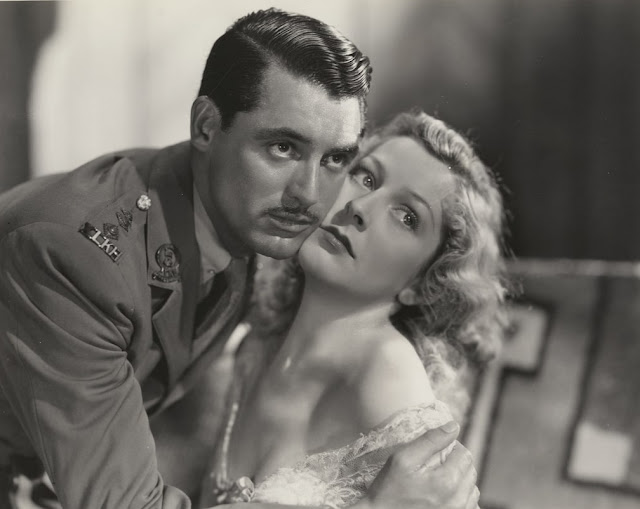I'm No Angel - 6th October, 1933.
Wedding Present - 9th October, 1936.
The Last Outpost - 11th October, 1935.
The Awful Truth - 21st October, 1937.
Hot Saturday - 28th October, 1932.
It all started on Instagram in 2020, about Me and Archie...But here it is definitely more about him!!

I'm No Angel - 6th October, 1933.
Wedding Present - 9th October, 1936.
The Last Outpost - 11th October, 1935.
The Awful Truth - 21st October, 1937.
Hot Saturday - 28th October, 1932.
"...a curious mixture. Half of it is remarkably good and half of it quite abysmally bad."
 |
| With Gertrude Michael. |
The Last Outpost - Review is taken from 'The Films of Cary Grant' by Donald Deschner (1973):
"The Last Outpost, which will be shown shortly at the Plaza, is a curious mixture. Half of it is remarkably good and half of it quite abysmally bad. One can even put one's finger on the joins, and it will be well worth a visit if only because it indicates what might be made of the short story form on the screen. It consists of two stories unrelated except for the coincidence of characters. The first, which lasts for about half-an-hour, is a very well-directed and well-acted War story of a British secret service agent and his success in warning a defenseless tribe against a Kurd attack and inducing them to move with their flocks over a flooded river and across a snow-bound range of mountains to safe pastures. It is one of those stories of dogged physical endeavor that the film does so well. It belongs in the order of Grass and The Covered Wagon. Mr. Claude Rains as the secret service agent in Turkish uniform and Mr. Cary Grant as the incurably light-minded and rather stupid British officer whom he rescues from the Kurds both act extremely well. Mr. Rains's low husky voice, his power of investing even commonplace dialogue with smouldering conviction, is remarkable. He never rants, but one is always aware of what a superb ranter he could be in a part which did not call for modern restraint but only for superb diction. I should like to see him as Almanzor or Aurengzebe, for he could catch, as no one else could, the bitter distrust of the world, religious in its intensity, which lies behind the heroic drama.
The Last Outpost, if it had stopped on the mountain pass above the pastures with the officer on the way down to hospital and the comforts of Cairo and the secret agent turning back towards the enemy, would have been a memorable short film. Mr. Charles Barton, the director, has obviously used old documentaries: the crossing of the flooded river is not a California reconstruction, and all through this first section the camera is used with fine vigor to present a subject which could not have been presented on the stage.
I cannot see why we should not have serious films of this length as well as farces, short stories as well as novels on the screen. The essential speed and concision would be an admirable discipline for most directors, who are still, after seven years of talkies, tied to stage methods, and we might be saved from seeing such a good film as this padded out to full length by the addition of a more than usually stupid triangular melodrama of jealousy and last-minute rescue in the Sahara where needless to say Mr. Rains sacrifices his life at the end, for his wife's love, so that it all may end in the fixed, almost Oriental, short-hand of military melodrama, "It is better so," clasped fingers and topees off and fading bugle calls."
- Graham Greene, The Spectator
 |
| New Artwork by Rebekah Hawley at Studio36 - Number 20 - The Last Outpost (Lobby Card Style) |
Part Of
For more, see also:
The Last Outpost was Cary Grant's 20th full length feature film and was released today in 1935.
Directed by Charles Barton and Lois Gasnier.
Distributed by Paramount Pictures.
Running time: 75 minutes.